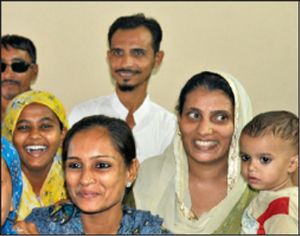
Ahmedabad, September 1: There was Eid-like euphoria in the 1,000-odd houses of Naroda Patia which bore the brunt of mayhem in the 2002 post-Godhra riots. Heavy rain in Ahmedabad on Friday did not dampen the spirits.
"It was a late Eid — one after 10 years. I haven't seen so many smiling faces in Naroda Patia over the past decade, which we spent praying for this day," said Dilawar Saiyad, 74, one of the prime witnesses in the case against BJP MLA Maya Kodnani. "I had lost faith in everything, but the judgment has proved that not all is bad in my India."
As the 32 convicts in the Naroda Patia massacre were awarded punishment, the families of victims and witnesses breathed a sigh of relief. Even those who had moved out of the locality for a day fearing a backlash returned home in the evening to join their society members. With securitymen dotting all lanes of Naroda Patia, residents checked their jubilation and shared the joy of their victory in small groups. The most elated were the survivors and witnesses who for the past four years had stood behind the case despite all odds.
"I was offered lakhs of rupees to change my statement and was also threatened," said Harun Sheikh, a rickshaw driver. "I had lost 10 people in my family, including my son and wife. I didn't want their lives to go waste and fought for justice. Today, I feel they would be happy with our victory too."
But as Patia remained alive, the mood was sombre in Hindu neighbourhoods of Kubernagar (Kodnani's home turf), Chharanagar, Meghaninagar and parts of Naroda, home to most of the convicts. Security arrangements remained tight as many shopkeepers voluntary observed bandh to protest the verdict. Tension even prevailed in the Mahajanvas area near Naroda Patia.
At Patia, the most excited of all witnesses was 29-year-old Shakila Bano, a tailor. "I have lived most of my life hidden inside the veil which I threw away in 2008 and pulled up my socks to nail the culprits. Today, I feel the happiest... I feel like flying."




Comments
Add new comment